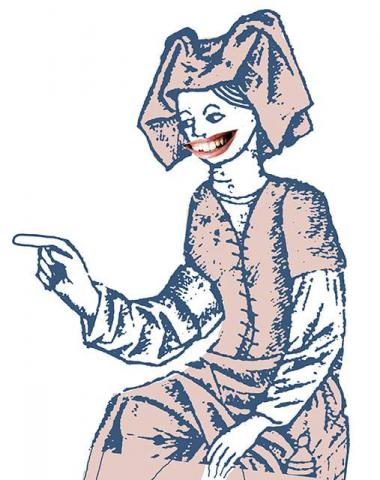
A team of academics tasked with researching the world’s oldest examples of recorded humor did just that. Led by Dr Paul McDonald from the University of Wolverhampton, they first defined a joke as having a clear set-up and punch line structure and spent two months trawling the annals of history.
Sorry oral tradition, you lose historically if you don't learn how to write, so the oldest confirmed joke is from 1900 BC.
They say it is a Sumerian - whose written language still forms the basis for Chinese now - and it goes thus: "Something which has never occurred since time immemorial; a young woman did not fart in her husband’s lap."
It occurs in tablets dating to the Old Babylonian period so it could possibly date back to 2,300 BC. The study notes that this joke is almost the ancient equivalent of a well known quip by the actor John Barrymore – “Love is the delightful interval between meeting a beautiful girl and discovering that she looks like a haddock.”
Other jokes that also make it onto the world’s oldest list include a more conventional gag from 1600 BC featured on the Westcar Papyrus and said to be about King Snorfru. "How do you entertain a bored pharaoh? You sail a boatload of young women dressed only in fishing nets down the Nile and urge the pharaoh to go catch a fish."
The tale of the three ox drivers from Adab completes the top three oldest jokes in the world. Dating back to 1200 BC, this joke adheres to the so called ‘rule of three’ where the set up for the joke is reiterated three times.
A full rundown of all the jokes unearthed in the research can be found at the Dave website http://www.dave-tv.co.uk/and at the end of this release.
The authors note the UK’s oldest joke is a crude riddle that features in the Exeter Codex and dates back to the 10th Century AD - "What hangs at a man’s thigh and wants to poke the hole that it’s often poked before?" Answer: A key
The UK’s oldest one liner is taken from England’s earliest jest book and was written in 1526 - "When a boy was asked by the Law to say his father’s craft, the boy answered that his father was a crafty man of Law."
Dr Paul McDonald, Senior lecturer at the University of Wolverhampton’s School of Humanities, Languages and Social Sciences, says: “The Dave Historical Humour Study shows that jokes have varied over the years, with some taking the question and answer format while others are witty proverbs or riddles. What they all share however, is a willingness to deal with taboos and a degree of rebellion. Modern puns, Essex girl jokes and toilet humour can all be traced back to the very earliest jokes identified in this research.”
Steve North, Dave channel head, says: “Throughout the years, British humour has always had an element of witty banter to it. What is interesting about these ancient jokes is that they feature the same old stand up comedy subjects: relationships, toilet humour and sex jokes. The delivery may be different, but the subject matter hasn’t changed a bit.”
